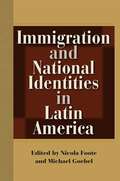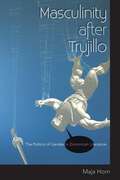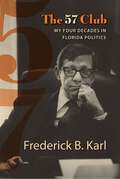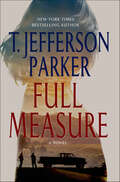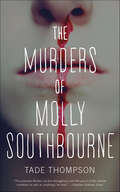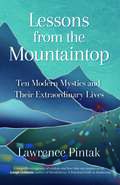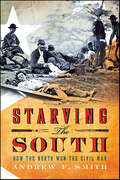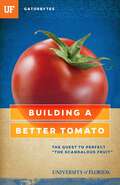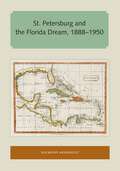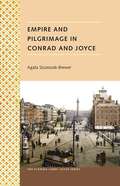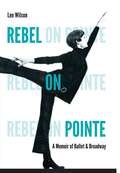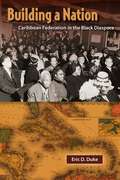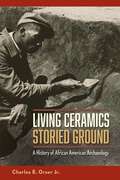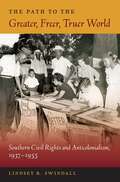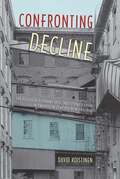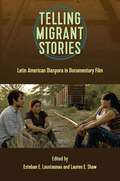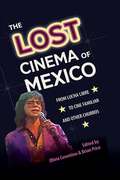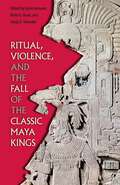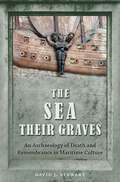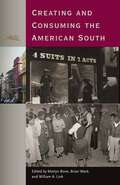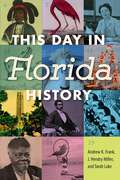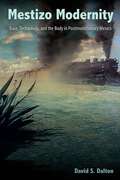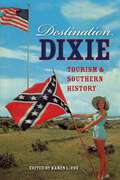- Table View
- List View
Winning While Losing: Civil Rights, The Conservative Movement and the Presidency from Nixon to Obama (Alan B. and Charna Larkin Symposium on the American Presidency)
by Kenneth Osgood and Derrick E. White"Explor[es] the paradoxical nature of racial politics in the post–civil rights period. . . . Does us the service of detailing how different presidential administrations handled civil rights, complicating our understanding of the major themes that defined the era."--American Historical Review "Adds depth to our historical understanding of how various presidents and their administrations approached issues pertaining to the equal rights of black (and to a lesser extent, Hispanic) Americans in a number of institutional and legislative arenas."--Journal of American History "Expertly link[s] executive decision-making and electoral strategizing with the politics of civil rights."--Journal of American Studies "Examines the forward and backward movement of civil rights since the resurgence of conservative politics in 1968. . . . Welcome and helpful."--Journal of Southern History "An invaluable addition to the rapidly developing historiography of neoconservativism, particularly the ideology’s relationship with African Americans."--Louisiana History "A striking example of a successful meshing of historical and political science methodologies and scholarship."--North Carolina Historical Review "This remarkable study offers breakthrough findings and insights about the state of civil rights policies in the post-civil rights era."--Hanes Walton Jr., coauthor of American Politics and the African American Quest for Universal Freedom "Eschewing easy absolutes, Winning While Losing presents a carefully nuanced interpretation of the subtle gains and losses experienced by liberals and conservatives, by Democrats and Republicans, and by proponents of racial justice and their opponents."--Harvard Sitkoff, author of Toward Freedom Land "Insightful and fascinating. Sets an agenda for further scholarly debate about the puzzle of 'winning while losing' that defines the fortunes of civil rights and the stratagems of politicians over the past generation."--Robert Mason, author of Richard Nixon and the Quest for a New Majority "A comprehensive account of the links between racism, conservatism, and presidential politics in the post-civil rights era."--Greta de Jong, author of Invisible Enemy: The African American Freedom Struggle after 1965 During the four decades separating the death of Martin Luther King and the election of Barack Obama, the meaning of civil rights became increasingly complex. Civil rights leaders made great strides in breaking down once-impermeable racial barriers, but they also suffered many political setbacks in their attempts to remedy centuries of discrimination. Complicating matters, the conservative turn in American political life transformed the national conversation about race and civil rights in surprising ways. This pioneering collection of essays explores the paradoxical nature of civil rights politics in the years following the 1960s civil rights movement by chronicling the ways in which presidential politics both advanced and constrained the quest for racial equality in the United States.
Immigration and National Identities in Latin America
by Nicola Foote and Micheal Goebal"This groundbreaking study examines the connection between what are arguably the two most distinguishing phenomena of the modern world: the unprecedented surges in global mobility and in the creation of politically bounded spaces and identities."--Jose C. Moya, author of Cousins and Strangers "An excellent collection of studies connecting transnational migration to the construction of national identities. Highly recommended."--Luis Roniger, author of Transnational Politics in Central America "The importance of this collection goes beyond the confines of one geographic region as it offers new insight into the role of migration in the definition and redefinition of nation states everywhere."--Fraser Ottanelli, coeditor of Letters from the Spanish Civil War "This volume has set the standard for future work to follow."--Daniel Masterson, author of The History of Peru Between the mid-nineteenth and mid-twentieth centuries, an influx of Europeans, Asians, and Arabic speakers indelibly changed the face of Latin America. While many studies of this period focus on why the immigrants came to the region, this volume addresses how the newcomers helped construct national identities in the Caribbean, Mexico, Argentina, and Brazil. In these essays, some of the most respected scholars of migration history examine the range of responses--some welcoming, some xenophobic--to the newcomers. They also look at the lasting effects that Jewish, German, Chinese, Italian, and Syrian immigrants had on the economic, sociocultural, and political institutions. These explorations of assimilation, race formation, and transnationalism enrich our understanding not only of migration to Latin America but also of the impact of immigration on the construction of national identity throughout the world. Contributors: Jürgen Buchenau | Jeane DeLaney | Nicola Foote | Michael Goebel | Steven Hyland Jr. | Jeffrey Lesser | Kathleen López | Lara Putnam | Raanan Rein | Stefan Rinke | Frederik Schulze
Masculinity after Trujillo: The Politics of Gender in Dominican Literature
by Maja Horn"Provides an insightful look at the persistent power of masculinism in Dominican post-dictatorship politics and literature."--Ignacio López-Calvo, author of God and Trujillo "The ideas about masculinization of power developed by Horn are important not only to Dominican scholarship but also to Caribbean and other Latin American students of the intersection of history, political power, and gendered practices and discourses."--Emilio Bejel, author of Gay Cuban Nation Any observer of Dominican political and literary discourse will quickly notice the prevalence of certain notions of hyper-masculinity. In this extraordinary work, Maja Horn argues that these gender conceptions became ingrained during the dictatorship (1930-1961) of Rafael Leonidas Trujillo, as well as through the U.S. military occupation that preceded it. Where previous studies have focused mainly on Spanish colonialism and the sharing of the island with Haiti, Horn emphasizes the underexamined and lasting influence of U.S. imperialism and how it prepared the terrain for Trujillo’s hyperbolic language of masculinity. She also demonstrates how later attempts to emasculate the image of Trujillo often reproduced the same masculinist ideology popularized by his government. Through the lens of gender politics, Horn enables readers to reconsider the ongoing legacy of the Trujillato, including the relatively weak social movements formed around racial and ethnic identities, sexuality, and even labor. She offers exciting new interpretations of such writers as Hilma Contreras, Rita Indiana Hernández, and Junot Díaz, revealing the ways they challenge dominant political and canonical literary discourses.
The 57 Club: My Four Decades in Florida Politics (Florida Government and Politics)
by Frederick B. KarlThe 57 Club was the self-assigned name of the thirty-nine legislators first elected to the Florida House of Representatives in 1956. Karl's fascinating autobiography not only recalls those years, when Florida was in the midst of a transformation away from its rural, racially segregated, Deep South roots, but also offers intimate details into a half century of public service.By sharing his own experiences and reactions, describing what he witnessed or heard along the way, and telling stories about friends and colleagues, Karl gives readers a front row seat to some of the most captivating and turbulent moments in twentieth-century Florida politics. His insights into how the legislature functions--from the politics of committee assignments to the usefulness of lobbyists, from the savvy use of rules on the floor to debating skills, from polite ways of punishing unethical colleagues to the use of humor to calm angry exchanges, and much more--all make for an absorbing tale.
All Our Worst Ideas
by Vicky SkinnerTwo teens who have nothing in common work together at a record store in All Our Worst Ideas, a powerful and voice-driven YA novel from Vicky Skinner.When Amy, on her way to becoming valedictorian of her graduating class and getting accepted to her dream school, gets dumped by her long-term boyfriend, she takes a job at a record store to ease the pain. She needs a distraction, badly. Oliver, Amy’s record store co-worker, isn’t so sure about Amy—his complete opposite—but what he is sure of is his decision not to go to college. He just can’t figure out how to tell his mother. As they work late-night shifts at the record store, Amy and Oliver become friends and then confidantes and then something more, but when Amy has a hard time letting go of what she thought was her perfect future with her ex, she risks losing the future she didn’t even know she wanted with Oliver.
Full Measure: A Novel
by T. Jefferson Parker"A tense and compelling drama of the wars without and the wars within—and of the flame of violence that burns through the American psyche." —T.C. Boyle, New York Times bestselling author of The Women"Stunning . . . [Parker is] a brave and daring writer." —Lisa See, New York Times bestselling author of Shanghai Girls and Dreams of Joy"A great American family novel. . . . Parker is playing in the same league as John Steinbeck." —Stephen Harrigan, author of The Gates of the Alamo and Remember Ben ClaytonPatrick Norris has seen the worst that Afghanistan has to offer–excruciating heat, bitter cold, and death waiting behind every rock as comrades are blown to pieces by bombs and snipers. He returns home exhilarated by his new freedom and eager to realize his dream of a sport fishing business. But he is shocked to learn that the avocado ranch his family has owned for generations in the foothills of San Diego has been destroyed by a massive wildfire and the parents he loves are facing ruin.Ted Norris worships his brother and yearns for his approval. Gentle by nature, but tormented by strange fixations with a dark undercurrent, Ted is drawn into a circle of violent, criminal misfits. His urgent quest to prove himself threatens to put those he loves in peril.Patrick puts his own plans on hold to save the family's home and falls in love with Iris, a beautiful and unusual woman, when disaster strikes. When Ted's plan for redemption goes terribly wrong, he tries to disappear. Desperate to find his brother and salvage what remains of his family, Patrick must make an agonizing choice.Three-time Edgar Award-winner T. Jefferson Parker is known for his many bestselling crime novels, from Laguna Heat to The Famous and the Dead.Full Measure marks a departure; it is a literary novel that explores many subjects, among them the bonds of loyalty between brothers.
The Murders of Molly Southbourne
by Tade Thompson"A bold outpouring of flesh and crisis at once horrifying and familiar." —The New York TimesWinner of the 2018 Nommo Award for Best NovellaEvery time she bleeds a murderer is born. Experience the horror of Tade Thompson's The Murders of Molly Southbourne. A finalist for the 2017 BSFA Award, the 2017 Shirley Jackson Award. The rule is simple: don’t bleed.For as long as Molly Southbourne can remember, she’s been watching herself die. Whenever she bleeds, another molly is born, identical to her in every way and intent on her destruction.Molly knows every way to kill herself, but she also knows that as long as she survives she’ll be hunted. No matter how well she follows the rules, eventually the mollys will find her. Can Molly find a way to stop the tide of blood, or will she meet her end at the hand of a girl who looks just like her?At the Publisher's request, this title is being sold without Digital Rights Management Software (DRM) applied.
Lessons from the Mountaintop: Ten Modern Mystics and Their Extraordinary Lives
by Lawrence PintakLessons from the Mountaintop is an inspiring account of the experiences of modern-day spiritual explorers who have dedicated their lives to the mystic quest to find their own Truth. It is aimed at readers looking for answers in our complex and challenging world. Few of us will ever retreat to a mountaintop or spend decades in monastic silence. Some of the individuals profiled in Lessons from the Mountaintop have done exactly that. Others have spent their lives studying with spiritual masters of multiple traditions. A New York record company art director, a medical doctor from Australia, a formerly unhoused non-binary BIPOC Californian, and other once “ordinary” folk who have carved out their own unique spiritual paths. You will not find them on the best seller lists or the Spiritual 100 rankings. Most of them quietly pursue their spiritual quest far from the media spotlight. What prompted them to walk away from it all? What do they see that the rest of us do not? What lessons do they bring “back” from their spiritual journeys? What can we learn from them? Veteran journalist and author Lawrence Pintak introduces the reader to individuals of grace and profound spiritual experience who he has encountered in his decades reporting from around the globe, and others he sought out as he explored unfamiliar spiritual traditions. The result is a fascinating collection of profiles that offer deep insight into what has been called the “perennial wisdom” at the heart of the world’s religions. Lessons from the Mountaintop contains lessons for us all, whether we are religious, spiritual, or simply trying to navigate our complex and challenging world.
Starving the South: How the North Won the Civil War
by Andrew F. SmithA historian's new look at how Union blockades brought about the defeat of a hungry Confederacy In April 1861, Lincoln ordered a blockade of Southern ports used by the Confederacy for cotton and tobacco exporting as well as for the importation of food. The Army of the Confederacy grew thin while Union dinner tables groaned and Northern canning operations kept Grant's army strong. In Starving the South, Andrew Smith takes a gastronomical look at the war's outcome and legacy. While the war split the country in a way that still affects race and politics today, it also affected the way we eat: It transformed local markets into nationalized food suppliers, forced the development of a Northern canning industry, established Thanksgiving as a national holiday and forged the first true national cuisine from the recipes of emancipated slaves who migrated north. On the 150th anniversary of the Battle of Fort Sumter, Andrew Smith is the first to ask "Did hunger defeat the Confederacy?".
Building a Better Tomato: The Quest to Perfect "The Scandalous Fruit"
by Jeff Klinkenberg University of FloridaIn the search for a superior alternative to bland and mealy grocery-store tomatoes, horticultural scientist Harry Klee and renowned taste researcher Linda Bartoshuk teamed up and are hot on the trail of a specimen that will have you thinking you just picked it in your own back yard. Gatorbytes highlight for the intellectually curious the world of innovative research happening at the University of Florida. Written by professional journalists, Gatorbytes feature the top research and preeminence work being conducted at the University of Florida, written in a way that’s easy to understand.
St. Petersburg and the Florida Dream, 1888–1950 (Florida and the Caribbean Open Books Series)
by Raymond ArsenaultThe books in the Florida and the Caribbean Open Books Series demonstrate the University Press of Florida’s long history of publishing Latin American and Caribbean studies titles that connect in and through Florida, highlighting the connections between the Sunshine State and its neighboring islands. Books in this series show how early explorers found and settled Florida and the Caribbean. They tell the tales of early pioneers, both foreign and domestic. They examine topics critical to the area such as travel, migration, economic opportunity, and tourism. They look at the growth of Florida and the Caribbean and the attendant pressures on the environment, culture, urban development, and the movement of peoples, both forced and voluntary. The Florida and the Caribbean Open Books Series gathers the rich data available in these architectural, archaeological, cultural, and historical works, as well as the travelogues and naturalists’ sketches of the area in prior to the twentieth century, making it accessible for scholars and the general public alike. The Florida and the Caribbean Open Books Series is made possible through a grant from the National Endowment for the Humanities and the Andrew W. Mellon Foundation, under the Humanities Open Books program.
Empire and Pilgrimage in Conrad and Joyce (Florida James Joyce)
by Agata Szczeszak-Brewer"Original and significant. This book shows us how Conrad and Joyce manipulate representations of imperialist belief in the sacred to indict Western culture for its racist colonization. This striking reading of modernism emphasizes Conrad's and Joyce's use of chaos in general and pilgrimage in particular in terms of mapmaking, racial denigration, and strategies of power. Szczeszak-Brewer makes spectacular connections between sacred language, nation building, and literary representation."--Georgia Johnston, author of The Formation of Twentieth-Century Queer Autobiography Though they were born a generation apart, Joseph Conrad and James Joyce shared similar life experiences and similar literary preoccupations. Both left their home countries at a relatively young age and remained lifelong expatriates. Empire and Pilgrimage in Conrad and Joyce offers a fresh look at these two modernist writers, revealing how their rejection of organized religion and the colonial presence in their native countries allowed them to destabilize traditional notions of power, colonialism, and individual freedom in their texts. Throughout, Agata Szczeszak-Brewer ably demonstrates the ways in which these authors grapple with the same issues--the grand narrative, paralysis, hegemonic practices, the individual's pilgrimage toward unencumbered self-definition--within the rigid bounds of imperial ideologies and myths. The result is an engaging and enlightening investigation of the writings of Conrad and Joyce and of the larger literary movement to which they belonged.
Rebel on Pointe: A Memoir of Ballet and Broadway
by Lee WilsonShort, plump, pigeon-toed, and never good enough for mom, Lee Wilson dared to dream she could grow up to be a star. In this uplifting memoir, Wilson describes how she grand jetéd from the stifling suburbia of the 1950s, a world of rigid gender roles, to the only domain where women and men were equally paid and equally respected—in grand, historic dance theaters and under the bright lights of the Broadway stage.At the age of sixteen, Wilson made her classical ballet debut in Monte Carlo. Eight months later, she thrilled to the sound of her first bravos—and she never looked back. After touring Europe and dancing with the Metropolitan Opera Ballet in New York, she set her sights on Broadway, where she danced in many Broadway shows, including Hello Dolly! and the record-breaking performance of A Chorus Line.Rebel on Pointe immerses the reader in a remarkable and visionary world. It lifts the veil of myth surrounding legendary dance icons like George Balanchine to reveal the real men and women who have made American dance and dancers an international phenomenon.Wilson expertly depicts how her profession—at times considered so rigid and exacting—was a leading force in the liberation of women from the prison of post-war society. The hard-won gains and the maddening setbacks of the gender revolution are seen here through the eyes of a young dancer searching for freedom one “pas” at a time.
Building a Nation: Caribbean Federation in the Black Diaspora (New World Diasporas)
by Eric D. DukeThe initial push for a federation among British Caribbean colonies might have originated among colonial officials and white elites, but the banner for federation was quickly picked up by Afro-Caribbean activists who saw in the possibility of a united West Indian nation a means of securing political power and more. In Building a Nation, Eric Duke moves beyond the narrow view of federation as only relevant to Caribbean and British imperial histories. By examining support for federation among many Afro-Caribbean and other black activists in and out of the West Indies, Duke convincingly expands and connects the movement's history squarely into the wider history of political and social activism in the early to mid-twentieth century black diaspora. Exploring the relationships between the pursuit of Caribbean federation and black diaspora politics, Duke convincingly posits that federation was more than a regional endeavor; it was a diasporic, black nation-building undertaking--with broad support in diaspora centers such as Harlem and London--deeply immersed in ideas of racial unity, racial uplift, and black self-determination. A volume in this series New World Diasporas, edited by Kevin A. Yelvington
Living Ceramics, Storied Ground: A History of African American Archaeology
by Charles E. Orser Jr.The role of historical archaeology in the study of African diaspora history and culture Exploring the archaeological study of enslavement and emancipation in the United States, this book discusses significant findings, the attitudes and approaches of past researchers, and the development of the field. Living Ceramics, Storied Ground highlights the ways historical archaeology can contribute to the study of African diaspora history and culture, as much of the daily life of enslaved people was not captured through written records but is evidenced in the materials and objects left behind. Including debates about cultural survivals in the 1920s, efforts to find “Africanisms” at Kingsley plantation in the 1960s, and the realization—as late as the 1970s—that colonoware pottery was created by enslaved people, Charles Orser looks at the influential and often mistaken ideas of prominent anthropologists, archaeologists, and historians. Extending to the present, Orser describes how archaeology better recognizes and appreciates the variety and richness of African American culture during slavery, due in large part to the Black archaeologists, past and present, who have worked to counter racism in the field. While acknowledging the colonial legacy of archaeology, Charles Orser outlines the ways the discipline has benefitted by adopting antiracist principles and partnerships with descendant communities. This book points to the contributions of excavators and researchers whose roles have been overlooked and anticipates exciting future work in African American archaeology. Publication of this work made possible by a Sustaining the Humanities through the American Rescue Plan grant from the National Endowment for the Humanities.
The Path to the Greater, Freer, Truer World: Southern Civil Rights and Anticolonialism, 1937–1955 (New Perspectives on the History of the South)
by Lindsey R. SwindallThe Southern Negro Youth Congress and the Council on African Affairs were two organizations created as part of the early civil rights efforts to address race and labor issues during the Great Depression. They fought within a leftist, Pan-African framework against disenfranchisement, segregation, labor exploitation, and colonialism. By situating the development of the SNYC and the Council on African Affairs within the scope of the long civil rights movement, Lindsey Swindall reveals how these groups conceptualized the U.S. South as being central to their vision of a global African diaspora. Both organizations illustrate well the progressive collaborations that maintained an international awareness during World War II. Cleavages from anti-radical repression in the postwar years are also evident in the dismantling of these groups when they became casualties of the early Cold War. By highlighting the cooperation that occurred between progressive activists from the Popular Front to the 1960s, Swindall adds to our understanding of the intergenerational nature of civil rights and anticolonial organizing.
Confronting Decline: The Political Economy of Deindustrialization in Twentieth-Century New England (Working in the Americas)
by David Koistinen"Koistinen puts the ‘political’ back in political economy in this fascinating account of New England’s twentieth-century industrial erosion. First-rate research and sound judgments make this study essential reading."--Philip Scranton, Rutgers University--Camden "Well-organized and clearly written, Confronting Decline looks at one community to understand a process that has become truly national."--David Stebenne, Ohio State University "Koistinen’s important book makes clear that many industrial cities and regions began to decline as early as the 1920s."--Alan Brinkley, Columbia University "Sheds new light on a complex system of enterprise that sometimes blurs, and occasionally overrides, the distinctions of private and public, as well as those of locality, state, region, and nation. In so doing, it extends and deepens the insights of previous scholars of the American political economy."--Robert M. Collins, University of Missouri The rise of the United States to a position of global leadership and power rested initially on the outcome of the Industrial Revolution. Yet as early as the 1920s, important American industries were in decline in the places where they had originally flourished. The decline of traditional manufacturing--deindustrialization--has been one of the most significant aspects of the restructuring of the American economy. In this volume, David Koistinen examines the demise of the textile industry in New England from the 1920s through the 1980s to better understand the impact of industrial decline. Focusing on policy responses to deindustrialization at the state, regional, and federal levels, he offers an in-depth look at the process of industrial decline over time and shows how this pattern repeats itself throughout the country and the world.
Telling Migrant Stories: Latin American Diaspora in Documentary Film (Reframing Media, Technology, and Culture)
by Esteban E. Loustaunau and Lauren E. ShawIn the media, migrants are often portrayed as criminals; they are frequently dehumanized, marginalized, and unable to share their experiences. Telling Migrant Stories explores how contemporary documentary film gives voice to Latin American immigrants whose stories would not otherwise be heard.The essays in the first part of the volume consider the documentary as a medium for Latin American immigrants to share their thoughts and experiences on migration, border crossings, displacement, and identity. Contributors analyze films including Harvest of Empire, Sin país, The Vigil, De nadie, Operation Peter Pan: Flying Back to Cuba, Abuelos, La Churona, and Which Way Home, as well as internet documentaries distributed via platforms such as Vimeo and YouTube. They examine the ways these films highlight the individual agency of immigrants as well as the global systemic conditions that lead to mass migrations from Latin American countries to the United States and Europe.The second part of the volume features transcribed interviews with documentary filmmakers, including Luis Argueta, Jenny Alexander, Tin Dirdamal, Heidi Hassan, and María Cristina Carrillo Espinosa. They discuss the issues surrounding migration, challenges they faced in the filmmaking process, the impact their films have had, and their opinions on documentary film as a force of social change. They emphasize that because the genre is grounded in fact rather than fiction, it has the ability to profoundly impact audiences in a way narrative films cannot. Documentaries prompt viewers to recognize the many worlds migrants depart from, to become immersed in the struggles portrayed, and to consider the stories of immigrants with compassion and solidarity. Contributors: Ramón Guerra | Lizardo Herrera | Jared List | Esteban Loustaunau | Manuel F. Medina | Ada Ortúzar-Young | Thomas Piñeros Shields | Juan G. Ramos | Lauren Shaw | Zaira Zarza A volume in the series Reframing Media, Technology, and Culture in Latin/o America, edited by Héctor Fernández L'Hoeste and Juan Carlos Rodríguez
The Lost Cinema of Mexico: From Lucha Libre to Cine Familiar and Other Churros (Reframing Media, Technology, and Culture in Latin/o America)
by Olivia Cosentino and Brian PriceThe Lost Cinema of Mexico is the first volume to challenge the dismissal of Mexican filmmaking during the 1960s through 1980s, an era long considered a low-budget departure from the artistic quality and international acclaim of the nation’s earlier Golden Age. This pivotal collection examines the critical implications of discovering, uncovering, and recovering forgotten or ignored films.This largely unexamined era of film reveals shifts in Mexican culture, economics, and societal norms as state-sponsored revolutionary nationalism faltered. During this time, movies were widely embraced by the public as a way to make sense of the rapidly changing realities and values connected to Mexico’s modernization. These essays shine a light on many genres that thrived in these decades: rock churros, campy luchador movies, countercultural superocheros, Black melodramas, family films, and Chili Westerns.Redefining a time usually seen as a cinematic “crisis,” this volume offers a new model of the film auteur shaped by productive tension between highbrow aesthetics, industry shortages, and national audiences. It also traces connections from these Mexican films to Latinx, Latin American, and Hollywood cinema at large.A volume in the series Reframing Media, Technology, and Culture in Latin/o America, edited by Héctor Fernández L’Hoeste and Juan Carlos RodríguezPublication of this work made possible by a Sustaining the Humanities through the American Rescue Plan grant from the National Endowment for the Humanities.
Ritual, Violence, and the Fall of the Classic Maya Kings (Maya Studies)
by Gyles Iannone, Brett A. Houk and Sonja A. SchwakeMaya kings who failed to ensure the prosperity of their kingdoms were subject to various forms of termination, including the ritual defacing and destruction of monuments and even violent death. This is the first comprehensive volume to focus on the varied responses to the failure of Classic period dynasties in the southern lowlands. The contributors offer new insights into the Maya "collapse," evaluating the trope of the scapegoat king and the demise of the traditional institution of kingship in the early ninth century AD--a time of intense environmental, economic, social, political, and even ideological change. A volume in the series Maya Studies, edited by Diane Z. Chase and Arlen F. Chase
The Sea Their Graves: An Archaeology of Death and Remembrance in Maritime Culture (New Perspectives on Maritime History and Nautical Archaeology)
by David J. StewartLike other groups with dangerous occupations, mariners have developed a close-knit culture bound by loss and memory. Death regularly disrupts the fabric of this culture and necessitates actions designed to mend its social structure. From the ritual of burying a body at sea to the creation of memorials to honor the missing, these events tell us a great deal about how sailors see their world. Based on a study of more than 2,100 gravestones and monuments in North America and the United Kingdom erected between the seventeenth and late twentieth centuries, David Stewart expands the use of nautical archaeology into terrestrial environments. He focuses on those who make their living at sea--one of the world's oldest and most dangerous occupations--to examine their distinct folkloric traditions, beliefs, and customs regarding death, loss, and remembrance.
Creating and Consuming the American South
by Martyn Bone, Brian Ward, and William A. LinkThis book explores how an eclectic selection of narratives and images of the American South have been developed and disseminated. The contributors emphasize how ideas of “the South” have real social, political, and economic ramifications, and that they register at various local, regional, national, and transnational scales.
This Day in Florida History
by Andrew K. Frank J. Hendry Miller Tarah LukeOn January 22, 1912, Henry Flagler rode on the first passenger train from South Florida to Key West. On April 2, 1513, Juan Ponce de León claimed Florida for Spain. On December 6, 1947, Everglades National Park held its opening ceremony. Featuring one entry per day of the year, this book is a fun and enlightening collection of moments from Florida history. Good and bad, famous and little-known, historical and contemporary, these events reveal the depth and complexity of the state’s past. They cover everything from revolts by Apalachee Indians to crashes at the Daytona 500, the establishment of Fort Mosé, and the recurrence of hurricanes. They involve cultural leaders like Stetson Kennedy and Zora Neale Hurston, iconic institutions like Disney and NASA, and important eras like Prohibition and the civil rights movement. Each entry includes a short description and is paired with a suggested reading for learning more about the event or topic of the day. This Day in Florida History is the perfect starting point for discovering the diversity of stories and themes that make up the Sunshine State.
Mestizo Modernity: Race, Technology, and the Body in Post-Revolutionary Mexico (Reframing Media, Technology,and Culture in Latin/o America)
by David S. DaltonHonorable Mention, Latin American Studies Association Mexico Section Best Book in the Humanities After the end of the Mexican Revolution in 1917, postrevolutionary leaders hoped to assimilate the country’s racially diverse population into one official mixed-race identity—the mestizo. This book shows that as part of this vision, the Mexican government believed it could modernize “primitive” Indigenous peoples through technology in the form of education, modern medicine, industrial agriculture, and factory work. David Dalton takes a close look at how authors, artists, and thinkers—some state-funded, some independent—engaged with official views of Mexican racial identity from the 1920s to the 1970s. Dalton surveys essays, plays, novels, murals, and films that portray indigenous bodies being fused, or hybridized, with technology. He examines José Vasconcelos’s essay “The Cosmic Race” and the influence of its ideologies on mural artists such as Diego Rivera and José Clemente Orozco. He discusses the theme of introducing Amerindians to medical hygiene and immunizations in the films of Emilio “El Indio” Fernández. He analyzes the portrayal of indigenous monsters in the films of El Santo, as well as Carlos Olvera’s critique of postrevolutionary worldviews in the novel Mejicanos en el espacio. Incorporating the perspectives of posthumanism and cyborg studies, Dalton shows that technology played a key role in race formation in Mexico throughout the twentieth century. This cutting-edge study offers fascinating new insights into the culture of mestizaje, illuminating the attitudes that inform Mexican race relations in the present day. A volume in the series Reframing Media, Technology, and Culture in Latin/o America, edited by Hector Fernandez L'Hoeste and Juan Carlos Rodriguez
Destination Dixie: Tourism and Southern History
by Karen L. CoxOnce upon a time, it was impossible to drive through the South without coming across signs to "See Rock City" or similar tourist attractions. From battlegrounds to birthplaces, and sites in between, heritage tourism has always been part of how the South attracts visitors—and defines itself—yet such sites are often understudied in the scholarly literature. As the contributors to this volume make clear, the narrative of southern history told at these sites is often complicated by race, influenced by local politics, and shaped by competing memories. Included are essays on the meanings of New Orleans cemeteries; Stone Mountain, Georgia; historic Charleston, South Carolina; Yorktown National Battlefield; Selma, Alabama, as locus of the civil rights movement; and the homes of Mark Twain, Margaret Mitchell, and other notables. Destination Dixie reveals that heritage tourism in the South is about more than just marketing destinations and filling hotel rooms; it cuts to the heart of how southerners seek to shape their identity and image for a broader touring public—now often made up of northerners and southerners alike.

